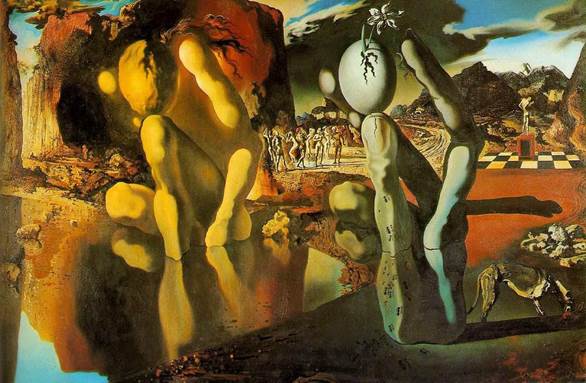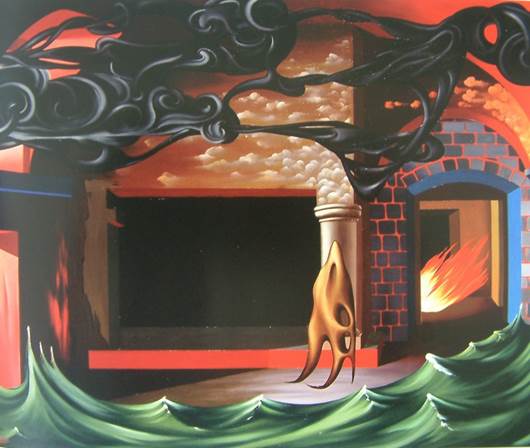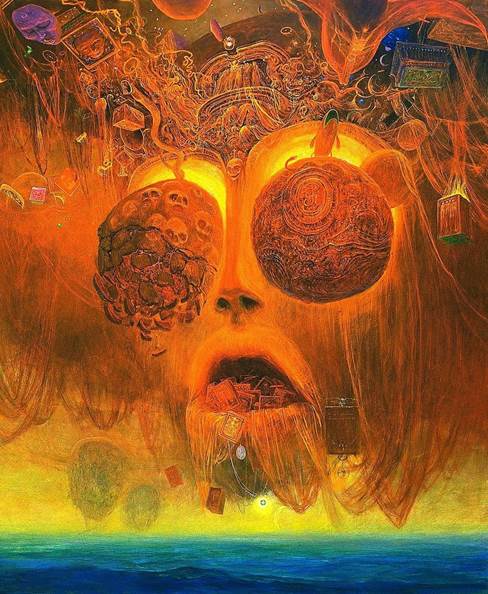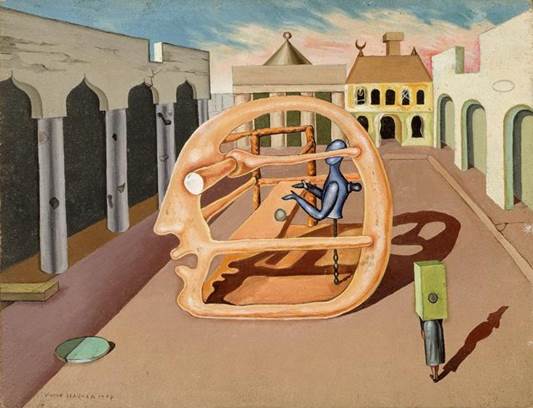|

Salvador Dali, The Metamorphosis of Narcissus, 1937
When my ex-wife Lisa called from L.A. in August of 2002, after being out
of touch for several years, to announce that she was planning a trip to
Boston, she asked that I contact our old and mutual friend Danny
Panagakos to inform him about the trip. She was working on a new video
project, a kind of autobiography, and wanted to compare and contrast then
and now versions of important people and places. She was very fond of
Danny. His voice advised her. His image lived in her heart. To Lisa, Danny
was a vampire god of the avant-garde. He referred to her as "Miss
Georgette."I hesitated. Lisa would not take "no" for an answer. "I'm not
sure Danny wants to hear from either one of us," I said.
Lisa was fond of Danny. But was he also fond of her—or of his parents, or
even of his wife, Salma? It was not clear to me that Danny could be truly
fond of anybody. Danny and Lisa had, in fact, slept together during the
hallucinated days that preceded our divorce, a fact about which Danny
wasted no time in informing me. He did not want to place roadblocks on
the freeway of our open communication. Did I care? No. It was an omen of
the end of an anachronistic drama. As such, it was welcome. I was,
however, puzzled by this need for confession on the part of someone so
incapable of guilt.
I had no clue as to his motivations then, at lease none that was allowed to
pass my threshold of awareness. Do I have one now? I don't have an
explanation but I do have a suspicion, and again, it has to do with drama.
There is little reason to apologize to an entity that does not exist, but, even
in the labyrinth of mirrors, the false self needs a cast of supporting actors.
The job of the supporting actors is to chant that the narcissist is the
Minotaur, the devouring god, the black hole at the center of the labyrinth,
towards which virgins of both sexes must converge. Transgression and
loyalty collaborated to feed the appetite of the growing supernova.
***
Pablo Picasso, Minotaur Transporting a Mare and a Foal, 1936
After a number of false starts, I finally managed to track Danny down at
the main branch of the Webster Public Library, where he had worked his
way to the top. Founded by Samuel Slater in 1812 and located on Lake "I'll
Fish on My Side and You Fish on Your Side and Nobody Fishes in the
Middle," as the translation from the Nipmuc goes, Webster is an old mill
town, once famous for the manufacturing of shoes and textiles, which had
been reimagined as an upscale bedroom community, with a stage-set-style
Main Street, during the high-tech "Massachusetts Miracle" of the 1980s.
The paint on all of the scenery is fresh. You will not find any worn spots on
the railings. There are ordinances against pigeons pooping on the statues,
and for this reason, they have set up tiny rest rooms. Even the manikins
look like Stepford versions of themselves. As odd as it might seem, such life
-like verisimilitude can be spectral, and such micromanaged quaintness
can be more than a bit disturbing. You would think that you were living in
the 1920s, at the latest, and that Norman Rockwell might, at any moment,
wander into the Owl Smoke Shop for tobacco.
Danny was now Director of Library Services for the town—an odd position
for a flamboyant avant-gardist. I stopped to wonder at how my friend
could pour so much energy into library science, which he hated, and so
little into his artwork, which, supposedly, he loved. This was also one of the
last places in which you would expect to find the Minotaur. A mastery of
the Dewey Decimal System was not a classically recognized attribute.
The library was, however, like the labyrinth, a hermetically-sealed
environment, in which the Minotaur could enforce the centrality of his role
. A high percentage of discordant feedback could be purged. Any leakage of
his occult hungers could be plausibly denied. Few traces would be left.
Amid the coolness of the well-lit shelves, the beast's rage would be more
difficult to detect than the whisper of air from the AC units.
After a wait of two minutes, Danny's assistant put me through. "Hi Danny,
this is Brian," I said. "Lisa is planning a trip to Boston next week, and she
asked if I could arrange a time and place for the three of us to meet. She's
working on a kind of video autobiography, incorporating some Super 8
footage from 1978, in which we were all doing our best to act experimental.
She was hoping to interview both of us, to revisit some of our favorite
places and to cut back and forth between the present and the past."
D: "Tell her that I'm busy."
B: "Lisa is traveling 3,000 miles, and it's been eight years since her last
trip. Are you sure that you can't set aside an hour for lunch?"
D: "Salma and I are building a house in Belize. I'm really very busy."
B: "Belize! Why Belize?"
D: "I'm disgusted with America. It has Americans in it, who disgust me. My
grandmother died last year. She left me all of her money, as well as all of
her real estate holdings. Money is not an issue anymore. I've worked
enough. Salma and I are planning to retire next year, in Belize, where
small, brown-skinned peasants will worship the ground we walk on.
"Are you still living on Hemenway Street, or have they thrown you out
yet?"
B: "I moved when I got married seven years ago. We own a house."
D: "A house! My, that really is impressive. Have you published anywhere,
or are you still the ne'er do well that my father always called you?"
B: "I've written four books since the last time that I saw you. I've published
here and there. What about you, Danny? Are you doing any writing or art?"
D: "I am, but I don't want to talk about it. You might steal my ideas again.
Did you know that I have a radio show? They pay me to destroy movies."
B: "Steal your ideas! You've got to be kidding. You've never actually shown
me any of your work, except for that black matchbook with your name
inside."
And so the conversation went. There was no rapport, no play of curiosity,
not the slightest trace of affection. "Lisa is going to be disappointed," I said.
"Perhaps you could give her a call."
D: "No. You talk to her. She's your ex-wife. I have no interest in ancient
history."
*
Towards the end of our conversation Danny confided, with considerable
self-satisfaction, a bit of information that I found amazing. He said, "I no
longer feel inhibited about being a bitch. I make sure that people know
what I think of them. I don't hide my feelings anymore."He presented this
as though such an attitude were the sign of some new maturity, as though
rudeness were not the most ancient of weapons in his arsenal. I could not
remember a time when Danny did not feel free to taunt or mock others
without the slightest of provocations. Friends did not get special privileges.
Passersby were not exempt.
I thought back to a lunch at Bangkok Cuisine that occurred perhaps 12
years before. Our mutual friend Janet was visiting from New York, and as
we were waiting for our Pad Thai and Green Duck Curry, Danny decided to
entertain us with a series of sarcastic improvisations. He was quite
inventively vicious, brilliant in his pantomime of the diners' gestures and
actions. He did not speak quietly, but projected his lines as to the top seats
in the balcony of a theatre. One especially outrageous comment took Janet
by surprise. She snorted, with explosive force, covering Danny with a large
amount of shrimp and lemongrass soup. The man sitting at the next table
turned to him, and said, "I'm glad that she spit on you! I was about to do it
myself."
Danny was special. Humans were stupid. Contempt was the most
appropriate response to the opinions and activity of others.
As Adam Smith, in The Wealth of Nations, wrote, "All for ourselves and
nothing for other people, seems, in every age of the world, to have been
the vile maxim of the masters of mankind." There were those who saw
such "selfishness" as a bad thing. Danny was not among them.

Felix Labisse, Hommage a Gilles de Rais, 1957
This had all been explained by the Egyptians, a good five or six thousand
years ago, in their theories about "styptic fire." This was the fire that,
paradoxically, contracted, and by such means brought the world into
existence—i.e., without it, there would be no world at all, but only sea,
wave upon black wave. Being livestock, the unwashed masses seemed
unable to appreciate that, even as things stood, the Elite was just barely
able to get by. They did not understand that Danny was the Minotaur, or
that he played by a different set of rules. One set was for him, another for
the human race. They did not see the omnipotence that he had volunteered
to give up, or that, as gift exchanges go, he had not received a gift of equal
value. Preoccupied with such inanities as rent, they just did not understand
how difficult it could be to choose between one vacation spot and another,
to weigh the relative merits of St. Thomas and Cancun. They had no grasp
of the existential loneliness of privilege.
The world was dead, and really very small. It was a sign that had burnt out,
a keyhole in which they had broken off the key, a drain down which the
Minotaur had been washed, inducing claustrophobia. It was a wasteland
inhabited by hungry ghosts, who would not shut up. They were always
informing the Minotaur of their "feelings." They insisted that he respond in
kind, and not just with a factually correct approximation. As if! When they
were done, they would then start in on their nutritional demands. Even the
most evolved of artists were somehow mysteriously flawed, although once,
against his better judgment, he had dared to imagine otherwise. They
could, perhaps, be likened to the test subjects of the World War Two
Japanese Vivisection Corps, Unit 731. They were of momentary interest
and of use as a raw data-source, but they would soon be thrown away, to
leave only a faint trace of energy in the air, a smudge of bioluminescence.
Once, the Minotaur had done his best to interpret the strange sounds that
humans made. As instructed by his Neo-Ahrimanian therapist, he had also
given a second chance to the most evolved of evolved artists—i.e., those
beloved by investment bankers—for all the good that it did him. No more
of that. Their vision was defective. Their brains were still in the larval
stage. Broken chromosomes did not allow them to acknowledge his
preeminence, which need not, of course, be justified by the production of
any actual work.
The pure idea was enough. Attitude was all. The perfected self was the
subtlest of creations. The Latter Day Orgiasts of Bataille would cleanse the
unconverted masses. Death would serve as a form of remedial education,
so that, from his bank of souls, the Minotaur would be able to draw the
blood-sustenance that he needed. Lady Justice in her blindfold would see
the light of his erased copy of a drawing by Joseph Beuys. She would
compel even the most arrogant of faux-sophisticates to kneel. Again, they
would be forced to grapple with the multiplicity of his forms. These forms
would flash, tumescent and hypnotic, on the still proto-digital screens of
their attention, in not all of which did he wear the Taurean mask or hook a
gold ring through his nose. Clouds would part. Before the eyes of an
unblinking crowd, the Chosen One would have Tantric sex with his own
reflections in mid-air.
The broadcast would provoke a revolution. Taurean-Guard youths would
throw critics into bonfires. Heads would roll, beginning with his own, as in
the "March to the Scaffold" movement of Berlioz's Symphonie Fantastique.
This would only serve to intensify his pleasure. The year would be Year
One. In response to popular demand, which would have swelled to
tsunami-like proportions, Caligula would then reinvent the Earth.
This long-range strategy for the Triumph of the Will had not changed
much since October of 1970, when, as high school juniors in Mr. Tsang's art
class, we traded jokes as we labored to assemble the tiny squares of our
color charts.
***

Zdzisław Bekzinsky, Untitled, 1974
Danny and I had lost touch several times before, only to have our
friendship spring mysteriously to life again. I thought back to a reunion
that occurred in 1977, when Danny and I had been out of touch for most of
the five years since high school, which had about it an uncanny aura of
fatality. Dissimilar though we were, some opaque force seemed to be
drawing us together, much as Lautreamont had arranged for the chance
meeting of a sewing machine and an umbrella on a dissecting table. We did
not fit into the same metaphysical frame, yet somehow, for all intents and
purposes, we did.
During the year of our engagement, Lisa was living in Narragansett, Rhode
Island, in a small house by the ocean. I would take the train from Boston
on Friday and return on Monday afternoon. The small house had a large
window that looked out on the bay. At sunset, the bay would be transmuted
into gold, a rippling sheet of it. The bay was wide but only a few feet deep,
so that fishermen with their fly rods would sometimes appear to walk on
water. It was a time of wide-eyed discovery. That something did happen
was sufficient proof that it was also meant to happen. One morning, over
breakfast, Lisa had said in passing, "I am almost out of money for
materials. Perhaps we will find a piece of space junk I can use." An hour
later, during a stroll to gather sea shells, we came across a piece of
scorched and twisted metal. The ten-foot scrap had fallen there in order
that we should find it, and it was asking to be transformed into art.
Salt freshened the air. The sea cast a spell. Roads were utterly black at
night, as we found when, on more than one occasion, we managed to get
lost. We were amazed to find that we could not see our hands, no matter
how close we held them. The eyes of unknown creatures opened in the
forest. A small cottage by the sea in what is the smallest state in the union
seemed the perfect place for us to begin a life together. In the backyard,
now and then, we could hear the screeching of a fox as he ran in and out of
the derelict chicken coop, as if, by some act of will, he could once more
cause the chickens to appear. We were not providing him with the tribute
to which he was accustomed. Work was not a pressing concern, and until
Lisa's evening shift at the Bamboo Garden Restaurant, there was nowhere
that either of us especially had to go. Birds acted as alarm clocks. By slow
degrees, the sun would wash into the room. It was into this stage-set that
my friend quite unexpectedly stepped. Out of nowhere, he appeared.
One day when Lisa, her housemate Paula and I were driving down a
highway, Paula turned to look at a hitchhiker and then shouted, "Whoa!
Look at that freak! He actually thinks that someone is going to pick him
up." On a traffic island stood an unshaven creature dressed entirely in
black leather, with a long skeleton earring. His thumb was out. His
expression: an arrogant sneer. There was something oddly familiar about
him. "Wait a minute," I said. "Turn the car around. That's no freak. That's
one of my closest friends from high school!"
In retrospect, our reunion consisted in our listening to Danny tell stories
about every good thing that anyone in New York or Rhode Island had ever
said about him. At a dune on Narragansett Bay, we had spread our beach
blanket out, for a lunch of cheddar cheese, grapes, and sourdough bread,
washed down with vodka and orange juice from paper cups. He talked,
and we responded. It is odd that I didn't stop to register the dynamic of
this communication at the time. This was Danny before the fall. He
overflowed with energy. His metaphysical balloon was still inflated. His
eyes were alive. His heart still seemed to beat, and his intellect had not yet
been cryogenically preserved. His stories were, in fact, amusing.
His experience in the New York S&M scene, where slaves would pay good
money to be whipped or lick his boots. The time his girlfriend Rivkah
made Nathan—a schizophrenic mathematician, who would later become
their pet—clean the kitchen floor with a toothbrush. Rivkah's interest in
having sex in laundromats and phone booths. His desire to perfect a form
of art that existed only in—and for—the pure realm of the intellect. How all
connections to the external world should be oblique. His photographs of
disasters to be hung with explanatory texts that did not make any reference
to the disasters they explained. His expanding circle of famous, almost
famous, and soon to be famous friends. His exhibitions at Franklin Furnace
and other alternative art galleries, which, however obscure to the masses,
were well respected by the Crypto-Calvinist Elect, by the inner circle, by
those in the know.

Victor Brauner, The Sender, 1937
At the labyrinth's heart, howled the ithyphallic Minotaur. Soon, the debt
that the race owed him was scheduled to come due. "Useless feeders" were
to provide for his material support, as well as the replenishment of his
supply of male and female virgins. After the ritual touching of the head
against the ground, each would offer his/ her tribute in the way that was
most appropriate. True feedback was the province of some fraction of a
percentage of an already super-select group.
The current version of the Elite was labyrinthine in its complexity, mirror
upon mirror, with each contradiction serving to generate a good half-dozen
others. Among those that had gathered to applaud him were the following:
Post-Marxian Deconstructionists, Fluxus Paint-by-Number Hedge-Fund
Managers, Raw Meat Installation Artists, Op-Art Vegans for the Reduction
of Earth's Population to a Sustainable 1 ½ Million, Neo-Abstract
-Expressionist Stamp Collectors, Dada Outreach Coordinators for the
Bilderberg Group, and Anti-Art Crusaders for the Transformation of the
Name into the Brand. As if we were living in an age before Copernicus,
Danny announced himself as the sun around which Earth and all other
planets must heretofore revolve. Hard evidence had accumulated. It could
not be denied. Fresh from the experience of a revelation, Danny pulsed
with a kind of messianic zeal.
|